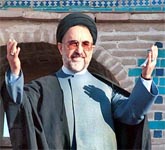Iran reformist defends Khatami's hand-shaking with European woman
 Tehran - An Iranian reformist justified and defended Mohammad Khatami, the reformists' top candidate for June's presidential election, for having shaken hands with a European woman during one of his trips abroad, the Fars news agency said Thursday.
Tehran - An Iranian reformist justified and defended Mohammad Khatami, the reformists' top candidate for June's presidential election, for having shaken hands with a European woman during one of his trips abroad, the Fars news agency said Thursday.
Shaking hands with women in public is forbidden in Iran, especially for officials because, according to Islamic regulations, men are not allowed to touch strange women.
A picture has circulated on the internet in which Khatami is shaking hands with a European woman during a trip abroad, reportedly two years ago in Italy.
Reformists said they fear that the photograph might be used against Khatami in his election campaign against President Mahmoud Ahmadinejad. Ultraconservatives argued that a cleric shaking hand with a foreign woman would not be fit to run in the presidential election of an Islamic state.
"If necessary and if national interests are at stake, then shaking hands with foreign women is no issue and not even opposed by Islamic jurisprudents," said Mostafa Koakabian, the head of the reformist party Mardomsalari.
"What Khatami did was out of expediency, and there should be no ballyhoo [by the ultraconservatives] over the issue," the reformist added in a meeting with students in Semnan in north-eastern Iran.
While foreign diplomats in Iran are familiar with the Islamic regulations and avoid shaking hands with the opposite sex, the situation gets more delicate for Iranian officials abroad, where foreign officials and especially ordinary people often do not know about the regulations and hence consider the rejection of the handshake as rude.
"Shaking hands with German Chancellor Angela Merkel is necessary," Koakabian said. "... If Merkel reaches out her hand, it should not be rejected as we are dealing there with national interests."
Khatami and Ahmadinejad are to face each other in the June 12 presidential election. While Khatami is the candidate of the reformist and moderate wings, Ahmadinejad is supported by ultraconservative and the clergy. (dpa)